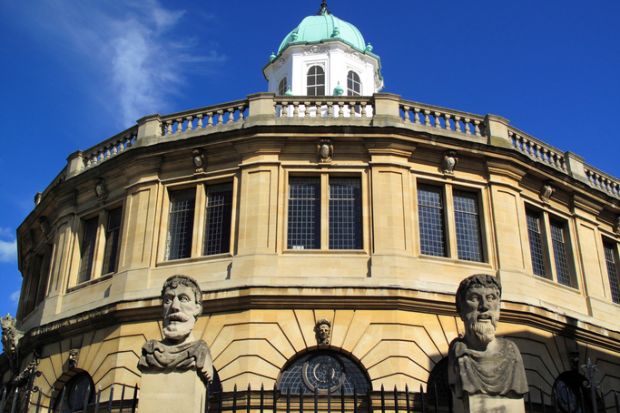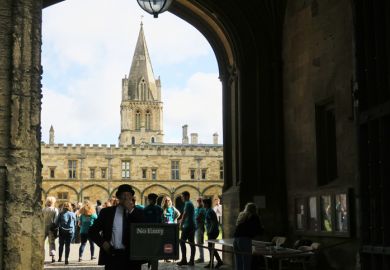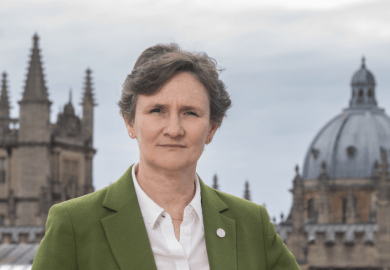This month’s election for the new chancellor of the University of Oxford could be the largest vote by the community of graduates and faculty of Oxford – or indeed of any British university – since the abolition of the House of Commons’ university constituencies in 1950.
These constituencies of graduates and faculty – Oxford, Cambridge, the University of Wales, Queen’s University Belfast, the University of London and the combined universities of England and Scotland – gave universities a distinctive role in national political life. Their MPs were even elected by single transferable vote, a form of which will apply to this election – in which I am a candidate.
The innovation of holding Oxford’s chancellorship election online (as opposed to requiring voters to turn up at the Sheldonian Theatre, as previously) means it will engage alumni around the world: there may be many votes from the US and China. Or we might find that those most motivated to vote are the excellent graduates of a range of universities now working at Oxford, who will have the greatest direct interest in its effective governance. Either way, it is good that alumni are for once being approached not for money but instead to help decide on the titular head of their university. That is an idea from which other universities could learn.
As for the position itself, some dismiss it as purely honorific. But while it is true that real power in the university rightly lies with Oxford’s parliament (“Congregation”), colleges and executive, led by the vice-chancellor, it is an intricate system, which the chancellor can help to make work – while also championing what makes Oxford special.
Indeed, universities are now subject to so much public scrutiny that ensuring good governance is a key responsibility. A chancellor, especially one with the legitimacy of election by graduates and faculty, can help them through all this, standing up for the university’s autonomy and providing well-informed private advice to the vice-chancellor and her colleagues – not least by reminding them that for many of their faculty, passionate about their research, the best governance just stays out of their way.
That does not mean Oxford’s governing bodies can escape the big challenges that UK universities face – and, as the media interest shows, the chancellor’s election is an opportunity to bring those issues to wider attention. As non-executives, candidates for the chancellorship should not give in to the pressure to set out our own agendas on the many specific issues facing Oxford, but I have some broad thoughts.
First is teaching. For many alumni, the tutorial is a special feature of Oxford, with its rigorous scrutiny of undergraduate essays together with the sheer volume of work expected. That is an enormous investment in teaching young people. The challenge is how to sustain high-quality teaching when resources are falling. The Teaching Excellence Framework (TEF) is an example of the kinds of measures that could accompany any increase in funding. My advice as a former higher education minister would be for the sector to get ahead of the game and actively promote discussion of what good teaching is and what might be measurable.
While the focus has been on teaching and fees, the deficit in UK research funding – more than £5 billion – is five times higher. Too much funding covers less than its full economic cost, and the application process has become expensive and time-consuming. The UK still has brilliant centres of research – the Oxford Vaccine Group, the Laboratory of Molecular Biology at Cambridge, the Gatsby Computational Neuroscience Unit at UCL, which is behind this year’s Nobel Prizes both in Physics and Chemistry. They thrive on patient, non-intrusive funding, and we need far more of that.
American universities are underpinned by endowments on a scale way beyond what even Oxford and Cambridge currently hold. The guilty secret of the American model is preferential access to university places for donors, which would rightly be unacceptable in the UK. But a real priority must be to build up endowments across the sector. Strong national support should help; the recent summit on inward investment is the kind of opportunity that needs to be taken to support research activities as well.
There is also the challenge of interdisciplinary working. Our progress on human embryology, for instance, owes a lot to ethicist Mary Warnock’s shaping of the regulatory regime, as well as life scientists’ research. The Oxbridge college can be the place where cross-disciplinary encounters and conversations occur, but there are other ways. Mission-thinking is in fashion and can also help break down these barriers.
I show in my book, A University Education, how in the past Oxford and Cambridge tried to suppress the creation of other universities – much to the frustration of innovators such as Francis Bacon. Now, as well as tackling the challenges they face themselves, they can also use their prestige to serve the wider ecosystem on which they depend.
I have visited just about every university in this country. I know what the challenges are for the sector, having just served on Universities UK’s Higher Education Commission. I have also worked with countries around the world on university and research policy and partnerships. Much has changed in the 800 years since Robert of Lincoln took the inaugural office of chancellor at the UK’s first university. However, the ideals of service and education remain core. The role is about the capacity to make an impact for Oxford and beyond.
David Willetts is a candidate for chancellor of the University of Oxford. He was UK minister for universities and science between 2010 and 2014. A full list of candidates is available here.
Register to continue
Why register?
- Registration is free and only takes a moment
- Once registered, you can read 3 articles a month
- Sign up for our newsletter
Subscribe
Or subscribe for unlimited access to:
- Unlimited access to news, views, insights & reviews
- Digital editions
- Digital access to THE’s university and college rankings analysis
Already registered or a current subscriber?








